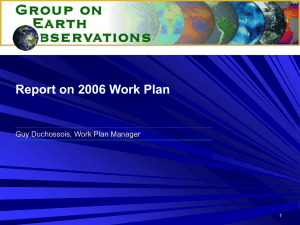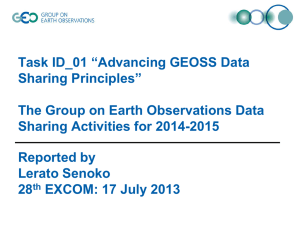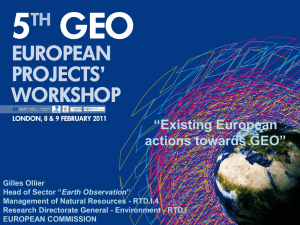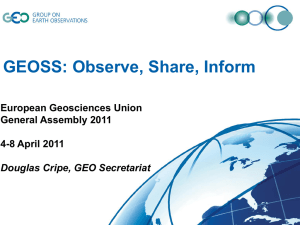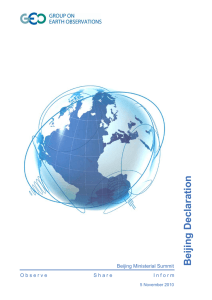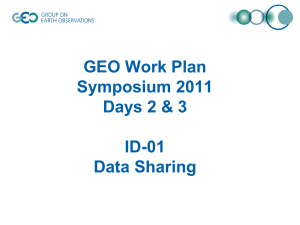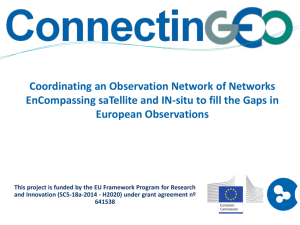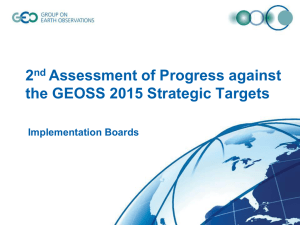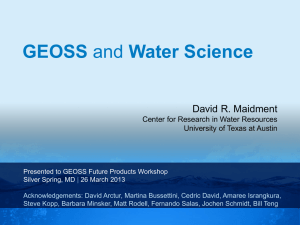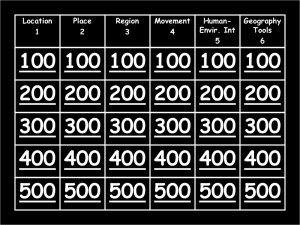AREA VI: Operational forecasting and modelling including
advertisement
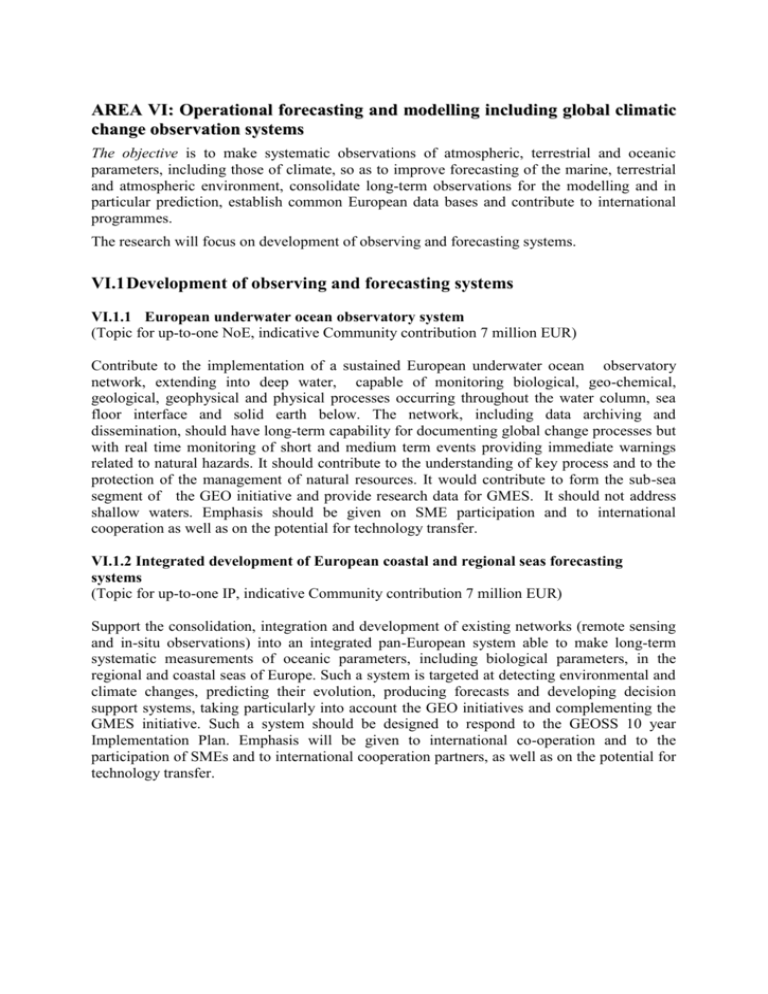
AREA VI: Operational forecasting and modelling including global climatic change observation systems The objective is to make systematic observations of atmospheric, terrestrial and oceanic parameters, including those of climate, so as to improve forecasting of the marine, terrestrial and atmospheric environment, consolidate long-term observations for the modelling and in particular prediction, establish common European data bases and contribute to international programmes. The research will focus on development of observing and forecasting systems. VI.1 Development of observing and forecasting systems VI.1.1 European underwater ocean observatory system (Topic for up-to-one NoE, indicative Community contribution 7 million EUR) Contribute to the implementation of a sustained European underwater ocean observatory network, extending into deep water, capable of monitoring biological, geo-chemical, geological, geophysical and physical processes occurring throughout the water column, sea floor interface and solid earth below. The network, including data archiving and dissemination, should have long-term capability for documenting global change processes but with real time monitoring of short and medium term events providing immediate warnings related to natural hazards. It should contribute to the understanding of key process and to the protection of the management of natural resources. It would contribute to form the sub-sea segment of the GEO initiative and provide research data for GMES. It should not address shallow waters. Emphasis should be given on SME participation and to international cooperation as well as on the potential for technology transfer. VI.1.2 Integrated development of European coastal and regional seas forecasting systems (Topic for up-to-one IP, indicative Community contribution 7 million EUR) Support the consolidation, integration and development of existing networks (remote sensing and in-situ observations) into an integrated pan-European system able to make long-term systematic measurements of oceanic parameters, including biological parameters, in the regional and coastal seas of Europe. Such a system is targeted at detecting environmental and climate changes, predicting their evolution, producing forecasts and developing decision support systems, taking particularly into account the GEO initiatives and complementing the GMES initiative. Such a system should be designed to respond to the GEOSS 10 year Implementation Plan. Emphasis will be given to international co-operation and to the participation of SMEs and to international cooperation partners, as well as on the potential for technology transfer. VI.1.3 European atmospheric observation systems (Topic for up-to-one IP, indicative Community contribution 7 million EUR) Continuation, optimisation and analyses of long-term ground based atmospheric observations complementary to satellite measurements. Significant improvement in the integration, as well as filling gaps, between ground-based and satellite measurements is required for the optimization of the European observing capabilities related to atmospheric composition, physical parameters and climatic change. The goal is to strengthen the observation of atmospheric climate parameters and the European component of the coordinated international observing networks. The project will contribute to the GEOSS aims for atmospheric composition and climate change. VI. 1.4 Framework for economic and social aspects of the 10 year Implementation Plan of the GEO (Topic for up-to-two STREPs/CA) The economic and social benefits are considered as the final objectives of the GEO initiative, nevertheless they have still to be defined and structured following each of the nine areas of the 10 year Implementation Plan. Methods and tools need to be defined and developed in order to provide quantitative and qualitative assessment of these benefits. Aggregation of results will have also to be considered. In addition an SSA will be funded by means of the provisions of Article 9.2.a. of the Rules for Participation: In contribution to the setting up of a Global Earth Observations System of Systems (GEOSS), the Commission will make a financial contribution1 to the World Meteorological Organisation (WMO) as the host international organisation for the secretariat of the Group on Earth Observations, by a specific support action as foreseen under Article 9.2.a of the Rules for Participation. The World Meteorological Organisation (WMO) will ensure, within their facilities in Geneva, the secretariat of the Group on Earth Observations. The GEO Secretariat will be hosted by WMO, through a separate account, in accordance with the WMO Financial Regulations. This Secretariat will be involved in the implementation of a Global Earth Observation System of Systems (GEOSS), as laid down in the 10-Year-Implementation-Plan, which was endorsed within the Resolution of the Third Earth Observation Summit, adopted on 16 February 2005 in Brussels. The Community contribution to the Secretariat for 2005-2006 shall be approximately 1.8 million EUR. 1 The Commission is full member of GEO since 16.02.2005 (Resolution of the third E.O. Summit and of the 10year GEOSS implementation plan).
